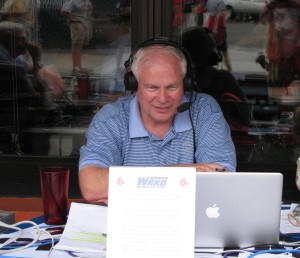 As I noted Thursday, one of the few positive contributions Rupert Murdoch can take credit for is preserving The Wall Street Journal as a great national newspaper. Another is that he saved the Boston Herald — not once, but twice. Larry Edelman of The Boston Globe writes about the first time (he interviewed me). I tell that story as well as the tale of Murdoch’s second rescue in my 2018 book “The Return of the Moguls,” which I excerpt below.
As I noted Thursday, one of the few positive contributions Rupert Murdoch can take credit for is preserving The Wall Street Journal as a great national newspaper. Another is that he saved the Boston Herald — not once, but twice. Larry Edelman of The Boston Globe writes about the first time (he interviewed me). I tell that story as well as the tale of Murdoch’s second rescue in my 2018 book “The Return of the Moguls,” which I excerpt below.
The Hearst chain, which had converted the Herald (known then as the Herald American) to a tabloid during the final years of its ownership, had run out the string by 1982. I remember one old-timer telling me that, with closure just hours away, workers came in to rip out the vending machines from the paper’s hulking plant in the South End. At the last minute, Murdoch reached a deal with the unions and the paper was saved.
Under Murdoch’s ownership, the Herald established itself as a feisty alternative to the Globe, sometimes beating its larger rival on important local stories. That continued in the 1990s after Murdoch’s protégé Pat Purcell bought it from him. To this day there are people who believe that Murdoch continued to pull the strings behind the scenes, but I never believed it. Murdoch just didn’t care that much about the Herald, and I don’t doubt that he let Purcell have it on extremely favorable terms.
Unfortunately, the Herald’s financial model pretty much stopped working in the early 2000s, and today it’s owned by the New York hedge fund Alden Global Capital, famous for sucking the life out of its papers. Alden owns two other Massachusetts papers as well — The Sun of Lowell and the Sentinel & Enterprise of Fitchburg.
At one time Murdoch also owned the Ottaway chain, which included the Cape Cod Times and some small weeklies, including the Middleboro Gazette, where I grew up. Murdoch is fondly remembered by taking a hands-off approach, but I honestly wonder whether he even knew those papers were part of his empire. The Gazette was later closed by the Gannett chain, and today Middleborough is served by an independent startup, Nemasket Weekly.
Here’s what I wrote in “Moguls” about the Herald and Murdoch’s TV station, WFXT-TV (Channel 25), which he sold off a few years ago. The “endless struggle” I refer to was the Herald’s long-time ownership of Channel 5, an existential threat to the Globe that was removed when the Globe reported that its rival had gained the broadcast license because of corruption at the Federal Communications Commission. The Herald was stripped of its license in 1972, and Hearst swooped in to pick up the pieces.
The Globe’s endless struggle with the Herald’s broadcast ambitions played itself out in one last, faint echo in 1988, when Murdoch, who then owned the Herald, purchased Channel 25. Ted Kennedy, by then a leading member of the Senate, quietly slipped a provision into a bill that made it almost impossible for the FCC to grant a waiver to its rule prohibiting someone from owning both a daily newspaper and a TV station in the same market. At the time, I was a reporter for The Daily Times Chronicle, which served Woburn and several surrounding communities north of Boston. I remember covering a local appearance by Kennedy as he was dogged by the Herald reporter Wayne Woodlief. “Senator, why are you trying to kill the Herald?” the persistent Woodlief asked him several times.
Murdoch chose to sell off Channel 25, thus saving the Herald; he repurchased the TV station after selling the Herald to Purcell. But the Herald columnist Howie Carr remained bitter. He told me years later that Kennedy’s actions were worse than [Globe ally Tip] O’Neill’s, since O’Neill was just trying to help one of several papers rather than destroy the Globe’s only daily competitor. “I think Tip was just trying to get an ally,” Carr said, “whereas Ted was trying to kill the paper in order to deliver the monopoly to his friends.”
The liberal reputation the Globe developed during the Winship era was cemented during Boston’s school desegregation crisis of the mid-1970s, when the Globe wholeheartedly supported federal judge Arthur Garrity’s order to bus children to different neighborhoods in the city to achieve racial balance. It was a terrible time in Boston, as white racism ran rampant and bullets were fired into the Globe’s headquarters and at one of the paper’s delivery trucks. The Globe took the right moral stand, and its coverage earned the paper its second Pulitzer for Public Service. Winship in those years enjoyed a reputation as one of the finest editors in the country. But it was also during those years that the Globe became known as the paper of Boston’s suburban liberal elite and the Herald that of the urban white working class, a dichotomy that has persisted to this day.
Leave a comment | Read comments





 Yes, as a matter of fact, I am old enough to remember Glenn Ordway as the color man back when the legendary Johnny Most was doing Celtics play-by-play.
Yes, as a matter of fact, I am old enough to remember Glenn Ordway as the color man back when the legendary Johnny Most was doing Celtics play-by-play.